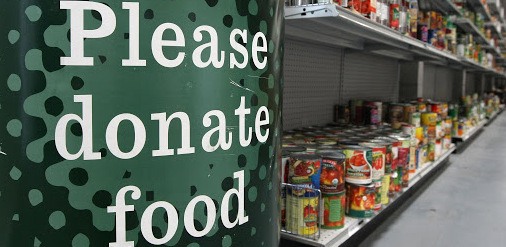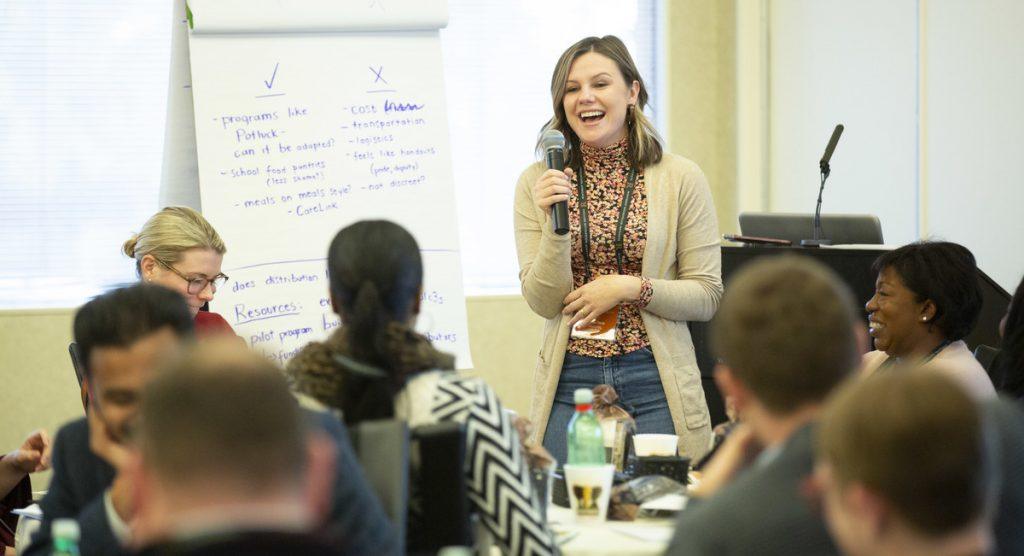Under 40 Forum focuses on hunger relief, poverty
by February 26, 2020 2:25 pm 1,046 views

Two days on a mountain made a group of two dozen young leaders hungry to make a difference. This wasn’t any ol’ mountain, these weren’t any young leaders, and this wasn’t any easy issue with which to grapple.
The 5th annual Under 40 Forum on Petit Jean Mountain at the Winthrop Rockefeller Institute was held last Thursday and Friday (Feb. 20-21). Twenty-four representatives from the Northwest Arkansas Business Journal and Arkansas Business Forty Under 40 leadership groups discussed potential solutions to poverty and hunger relief in Arkansas. The forum is conducted in partnership with the two media companies, the Rockefeller Institute and the Clinton School of Public Service. This year, members of the Delta Leadership Institute were also invited to join.
“I think it served an important purpose in educating folks that hunger is a symptom of the much larger problem of poverty in our state. I think the sessions and discussions motivated folks to work on addressing a range of issues related to hunger, including low wages, housing needs, and developing a stronger social safety net,” said Mervin Jebaraj, director of the Center for Business and Economic Research at the UA Walton College of Business. He is a 2019 NWA Business Journal Forty Under 40 recipient.
One out of every four children faces food insecurity in Arkansas. An estimated 17% of Arkansans live in poverty, which is defined as a family of four earning $25,750 or less per year.
“I was impressed with the Under 40 participants’ willingness to openly discuss the difficult issues surrounding hunger and poverty in Arkansas,” said James Hopper, director of programs at the Rockefeller Institute. “I look forward to seeing how they take what they learned at the Winthrop Rockefeller Institute and create change in their communities.”
BIG TAKEAWAYS
Through discussions and sessions over the two-day conference, Under 40 participants identified several areas they hope to persuade policy and decision-makers to consider while addressing hunger. They include:

1) Access to food for students: Acknowledging the link between hunger and poor educational performance, Under 40 leaders wondered whether free meals as a benefit for all school students, regardless of income, might be a possible solution. Additionally, Under 40 leaders expressed concern about growing food insecurity rates on college campuses and thought it would be helpful to create and/or support food pantries on college campuses.
2) Improved collaboration: Under 40 leaders learned about a number of programs and resources designed to address hunger in Arkansas, and wondered how those organizations share information about services and resources. Suggestions for strengthening collaboration included engaging existing service recipients to learn if their needs are being met and empowering those recipients by acting on their recommendations for improved service and resource delivery.
3) Social responsibility: Some Under 40 Leaders present at the forum thought businesses should consider the impact of wages in their organizations and be committed to fair wages that allow employees to live above the poverty level. Other suggestions including supporting “pay as you can” restaurants in communities that offer businesses and individuals the chance to make nutritious meals available to anyone regardless of their ability to pay.
4) Taking action: Forum participants considered how they might take individual action to address hunger in their own communities. Some commitments included engaging policymakers and advocating for policies designed to address hunger, volunteering with hunger relief organizations, donating money, and spending more time learning about the issues from people who experience hunger and poverty.
CALL TO ACTION
Tyler Clark, another NWA Business Journal Forty Under 40 recipient, is the executive director of the Single Parent Scholarship Fund of NWA. He said he was struck by how little poverty and hunger are understood and how complex solutions can be, despite the seemingly simple answer of getting food to the hungry.
“I thought the answers were pretty simple: improve access to food which included increasing SNAP and other government benefits, reduce areas with food deserts, increase access community gardens and fresh vegetables. Obviously the answer is much more complex,” Clark said.
“As a nonprofit service provider with all my clients living at 250% of poverty, I felt like I had a good handle on resources needed to get food into people’s bellies. I left the forum empowered to engage policymakers on how to give more access to nutritious food. I also want to evaluate my program delivery of resources and survey my client’s ability to access food,” he added.
One of the Arkansas Business Forty Under 40 recipients this year is State Rep. Jamie Scott, D-North Little Rock. Scott took the call to action so seriously she has already penned a letter to Gov. Asa Hutchinson asking for his help. Scott and Rep. Aaron Pilkington, R-Knoxville, have asked the governor for $50,000 to aid low-income and middle-income college students who are facing rising higher education costs and are threatened by a lack of access to affordable or nutritious food.
“We are respectfully requesting $50,000 from you to pilot and/or support food pantries at our state’s colleges and universities to address the rising need. The funds would be made available in $5,000 increments and any college or university in Arkansas would be welcome to apply,” the letter states.
“We would also like to encourage our fellow Arkansans to help with this initiative by giving them the opportunity to donate goods from an Amazon wish list through which donations will be sent directly to our colleges and universities,” they added.
In addition to networking, team building, and brainstorming solutions, the Under 40 members also heard from a number of speakers, including Kathy Webb with the Arkansas Hunger Relief Alliance and Dr. Emily English with UAMS and Arkansas Children’s Research Institute.

Ronnie Dedman, AT&T Arkansas President, was the keynote speaker at dinner. He discussed his company’s newly launched effort aimed at hunger relief. “AT&T Believe Arkansas” aims to help kids, veterans and seniors who don’t know where their next meal may come from find a steady food source.
The initiative has already collected more than 14,000 boxes of cereal, donated $100,000 to hunger relief organizations, and distributed 1,000 “patrol packs” to local law enforcement officials.
The “patrol pack” program is a collection of easy-to-prepare grocery items that officers can take with them in their vehicles. While on patrol, if officers encounter a family in need of food, they can provide them with the packs, which include items like peanut butter, easy-to-make skillet dinners, macaroni and cheese, pouches of tuna and easy-to-open canned goods.
AT&T will also help sponsor a summit on April 1 in Little Rock in conjunction with the Arkansas Hunger Relief Alliance. The Under 40 Forum participants indicated an interest in taking part.
